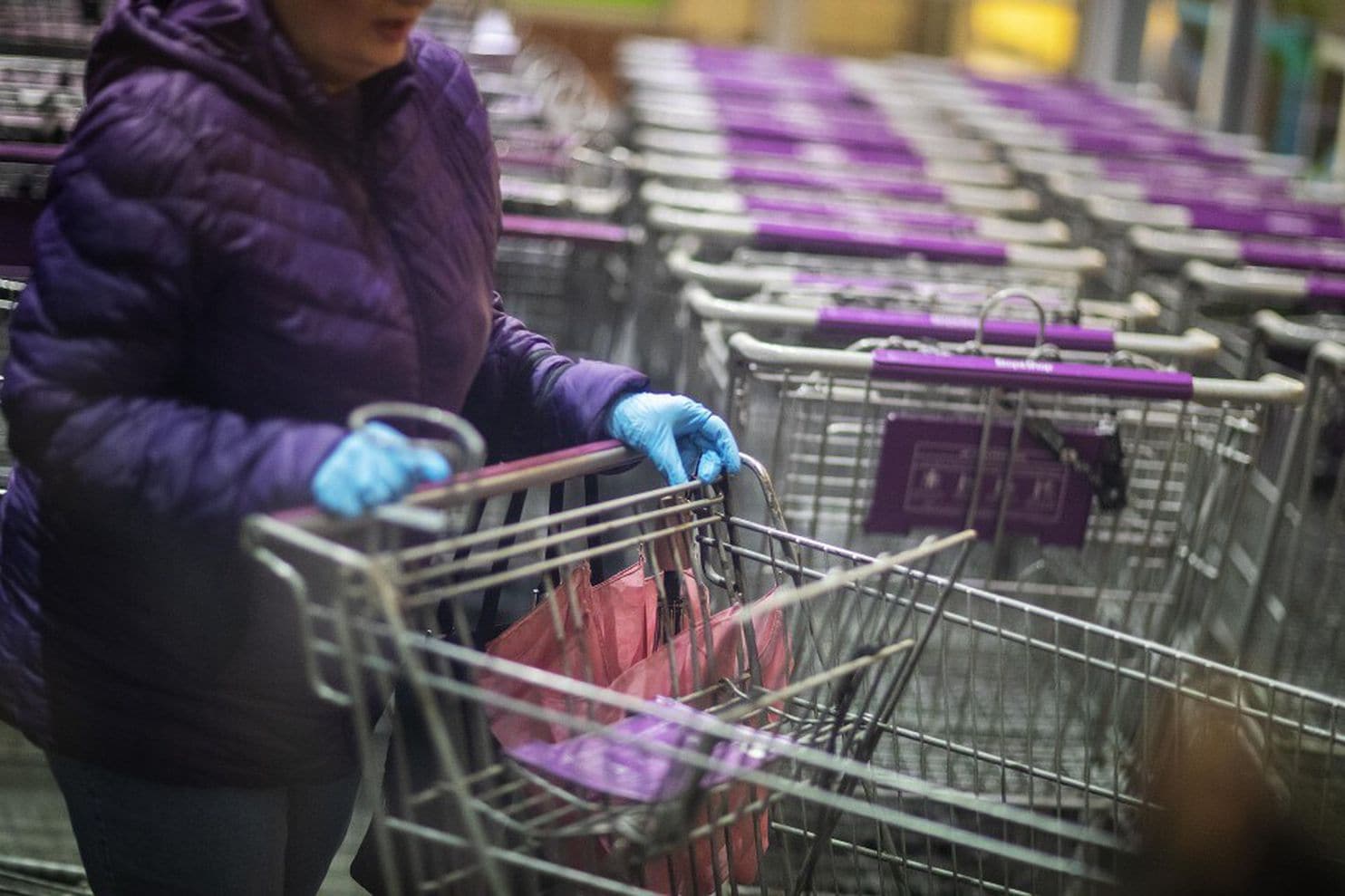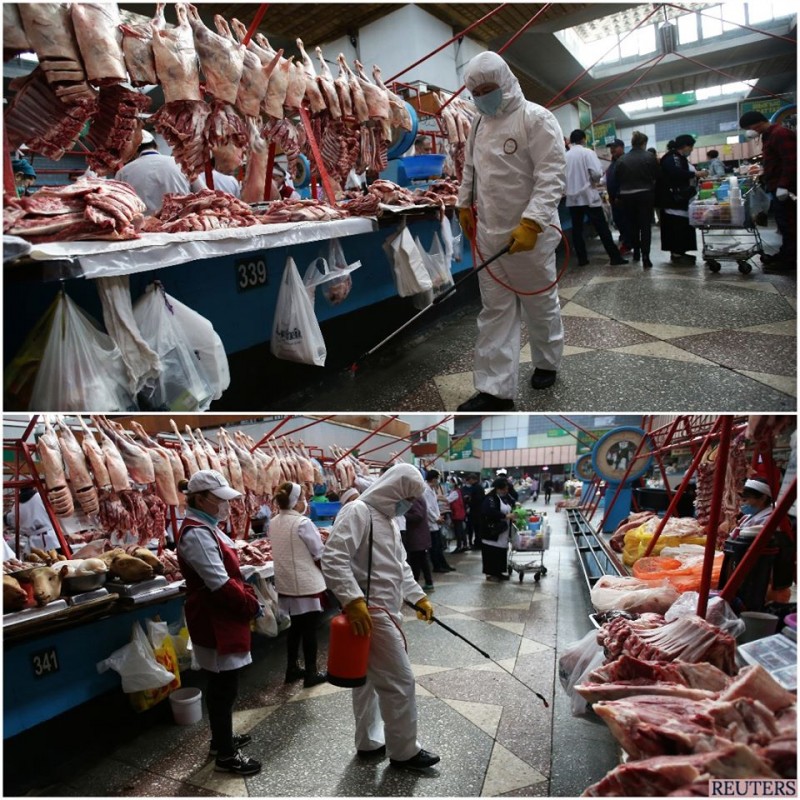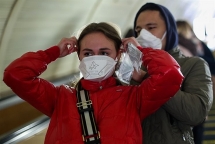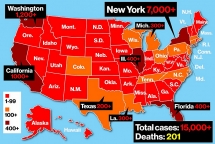Grocery shopping tips during the coronavirus
 |
| Social distancing has become an important new normal worldwide as countries try to stop the spread of coronavirus. |
The advice is the same as for any time spent outside the home: Limit contact with groups of people, wash your hands as soon as you get home and avoid touching your face, said Bettina Fries, chief of the Division of Infectious Diseases at Stony Brook University in New York.
People should go to the grocery store — or anywhere outside the home — only if they are feeling well and confident that they have not been exposed to the virus causing COVID-19.
Watch for symptoms in yourself and others in your household. They may include mild to severe respiratory illness with difficulty breathing, as well as fever and a cough. If you are concerned that you may have been exposed, self-quarantine. And, remember that the incubation period is from two to 14 days. That’s why it is important to avoid being in large crowds. People may be infected but not know yet.
Also, the practice of “social distancing” amid the ongoing coronavirus pandemic has been recommended by health agencies to stem the spread of COVID-19.
“Social distancing for COVID-19 means avoiding places or gatherings where you are likely to be exposed to respiratory droplets from others – directly or on surfaces,” Dr. Jill Grimes, an urgent care physician at The University of Texas, had previously told Fox News. “We know this virus is spread primarily by these droplets, up to a distance of roughly six feet (from a cough or a sneeze) and so avoiding areas where people are physically closer than six feet is key."
Who shouldn’t grocery shop?
Some people may be at higher risk for getting seriously ill from this virus, including older adults and people who have chronic health conditions, according to the Centers for Disease Control and Prevention. Because of this, grocery stores across the country have begun offering “seniors-only” grocery shopping times.
The biggest advantage to those special shopping times is that there should be fewer people in the stores, Fries said.
“Because everybody is panicking, there are a lot of people in the grocery stores, so if you belong in that group of people who are 65 or older, or immune compromised, then it is best to get someone else to shop for you, if you can,” Fries said. Along with asking family or friends to shop, she also recommends having groceries delivered.
Many delivery services offer no-contact drop-off, as well as electronic tipping. Such services are in high demand right now, so stay on top of your supplies and try to order a week or so before you have a need.
How often should go to the grocery?
Make less frequent and larger shopping trips. “It’s good to go once or twice a week” at the most, Fries said.
There’s no need to take every can of black beans off the shelf for your household of four, but, if you can afford to, buy enough food to last for two to three weeks. Buy and enjoy fresh foods now and stock up on dried spices and fruits, eggs, hard cheeses, shelf-stable cans and packaged goods, as well as frozen meat, vegetables and fruit. This may mean you won’t have the freedom to satisfy every craving, but you’ll have the sustenance you need.
 |
| A worker in a protective suit sprays disinfectant to prevent the spread of the coronavirus (COVID-19) at a local food market, also known as bazaar, in Almaty, Kazakhstan, Friday, March 20. |
What time should you shop?
The natural rhythms of your neighborhood grocery may have shifted because more people are working from home, but, generally, it is best to shop early in the morning and later at night to avoid crowds. Some US chains have begun limiting the number of people who can be in the store at one time and cutting store hours, so employees have time to clean and restock. If you arrive and the store is jammed, come back another time if you can.
“You want to avoid being in Costco with 200 people in a line,” Fries said. “You are not social distancing if you stand in a line with other people.”
Should you wear gloves? A mask?
The CDC is not recommending that shoppers wear gloves or masks. Neither is necessary, Fries said. The best advice remains: Wash your hands before you shop and immediately after you shop, do not touch your face, and try to stay at least six feet away from other shoppers and store employees
“Gloves don’t really protect you because … it sticks to the gloves the same way it sticks to your hands,” Fries said. “It’s not different.”
Most stores provide free wipes, but if they don’t, bring your own to wipe down the cart handles and use them to open freezer doors.
Touch as little as possible as you shop.
What to do when you get home with the groceries?
When you return home from any outing, wash your hands with soap and water for at least 20 seconds, especially before eating or preparing food. If soap and water are not available, use a hand sanitizer with at least 60 percent alcohol. After unpacking your groceries, wash your hands again and wash kitchen surfaces, such as countertops, any handles or switches, often.
If it gives you peace of mind, go ahead and wipe down cans and boxes with soap and water or disinfectant wipes before putting them away, but experts have not specifically recommended washing packaging before storing them.
The virus is not food-borne, experts said.
“We are not aware of any reports at this time of human illnesses that suggest COVID-19 can be transmitted by food or food packaging,” Food and Drug Administration Commissioner Stephen Hahn said in a Feb. 27 statement. The FDA recommends following the usual best practices for health and safety rules for handling food, such as cooking foods to their proper temperature and washing produce thoroughly.
“You’re not going to eat the can,” Fries said of packaged foods. “As long as you wash your hands, you’ll be okay.”
She emphasized that washing your hands and frequently touched surfaces is the key: “You can wash the virus off with just soap and water.”
 | The first pet dog infected with COVID-19 in Hong Kong has died The pet dog fed by a coronavirus patient in Hong Kong (China) - the first pet found infectious for noval coronavirus died on Monday (Mar ... |
 | A study shows that people with Type A blood may be more vulnerable to coronavirus People with type A blood are more likely to catch coronavirus while those with type O seem more resistant, a preliminary study of about 2,000 ... |
 | Embassy supports 6,500 students in Russia amidst COVID-19 outbreak First Secretary Ly Tien Hung of educational department said that the Vietnamese Embassy in Russia has kept a close watch on developments of COVID-19 and ... |
Recommended
 Handbook
Handbook
Vietnam Moves Up 8 Places In World Happiness Index
 Handbook
Handbook
Travelling Vietnam Through French Artist's Children Book
 Multimedia
Multimedia
Vietnamese Turmeric Fish among Best Asian Dishes: TasteAtlas
 Handbook
Handbook
From Lost to Found: German Tourist Thanks Vietnamese Police for Returning His Bag
Popular article
 Handbook
Handbook
Prediction and Resolution for the Disasters of Humanity
 Handbook
Handbook
16 French Films To Be Shown For Free During Tet Holiday In Vietnam
 Handbook
Handbook
Unique Cultural and Religious Activities to Welcome Year of the Snake
 Handbook
Handbook










